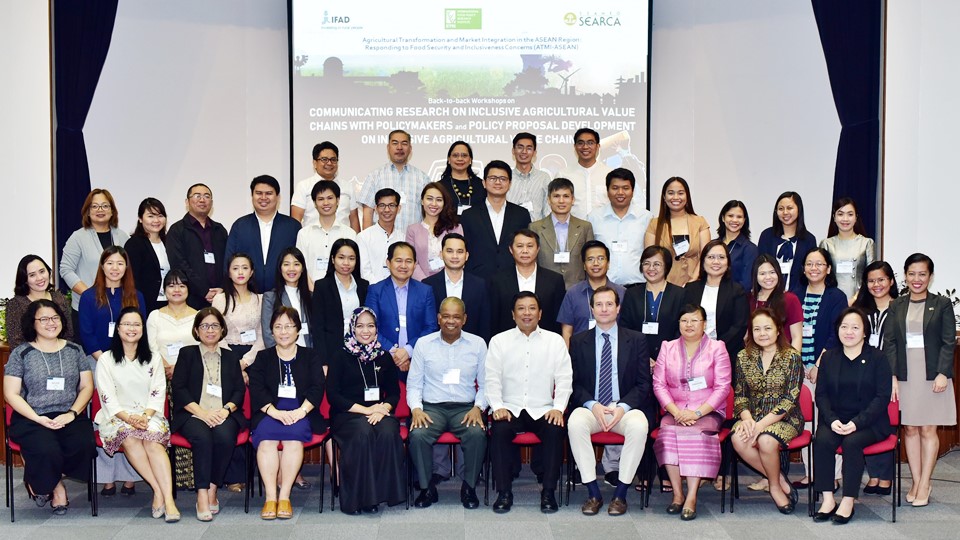Quick Facts:
Background and Rationale
In 2017, SEARCA partnered with the International Food Policy Research Institute (IFPRI) in implementing a research program funded by the International Fund for Agricultural Development (IFAD). Titled Agricultural Transformation and Market Integration in the ASEAN Region: Responding to Food Security and Inclusiveness Concerns or ATMI-ASEAN, the project has three major components one of which is technical assistance for planning and policy development. This component aims to assist the targeted ASEAN Member States (AMS) in designing programs and strategies for food security and value chain development in the region. The focus is on small-scale rural producers (SSRPs) and their integration within the ASEAN market.
National level policy studies in Cambodia, Lao PDR, Myanmar, Vietnam (CLMV) and the Philippines are analyzing the value chain of the following identified agricultural commodities: maize, pulses, and swine. It is hoped that such analyses will increase knowledge and understanding of the linkages and interrelationships that exist among the various actors along the chain, and provide evidence-based information that will support policy makers and program planners in better shaping policies and programs to enhance the overall performance of the value chain.
However, despite widespread recognition regarding the importance of integrating research findings into decision-making processes, communicating complex research concepts to policymakers, practitioners and non-technical audiences has remained a significant challenge to policy researchers. Policymakers often feel daunted by having to sift through voluminous research data and information, thus, they either ignore the materials or find them incomprehensible. This creates a gap between researchers and policy makers and at the same time, a lot of published studies with sound policy recommendations are often neglected or unappreciated by the intended users, undermining integration of evidence-based knowledge into decision- making processes.
Recognizing the importance of producing evidence- based value chain analysis to guide policies and interventions and at the same time translating complex research findings into clear, simple, concise actionable recommendations, SEARCA organized back-to back workshops on Communicating Research on Inclusive Agricultural Value Chains with Policy Makers and on Policy Proposal Development on Inclusive Agricultural Value Chains.
The first workshop on Communicating Research on Inclusive Agricultural Value Chains with Policy Makers primarily aimed to enhance the capacity of participants, including ATMI researchers, to develop effective and evidence-based communication materials and strategies to inform and guide policy decisions. On the other hand, the workshop on Policy Proposal Development on Inclusive Agricultural Value Chains focused on developing policies and interventions that will promote the participation of smallholders in sub-regional agricultural and food markets and enhance cooperation in food security and agricultural development among the selected countries. Through these back-to-back workshops, the participants were expected to produce peer-reviewed, publishable quality policy briefs and policy proposals and gain enhanced awareness of the process of communicating with policy and decision-makers and other intended users.
Intended Participants (Workshops 1 and 2)
- ATMI-ASEAN Research Teams and Focal Agencies
- Representatives from government and non-government organizations engaged in the promotion of inclusive and sustainable agricultural and rural development
- Commodity-based agencies; international, regional and national agencies undertaking value chain development projects
- Faculty, researchers and staff of state colleges and universities (SCUs)
Participation Requirements
Selected country participants had carried out research on the general theme of inclusive agricultural value chains. After having been selected, participants were asked to bring to the workshop the preliminary findings or results of their research and prepare a draft of their paper to work on during the workshop. The back-to-back workshop ran for five days, including plenary lecture sessions, small group discussions and independent work, to allow participants to draft a new version of their policy brief or paper. Some follow-up work between the participants and facilitators would be necessary to get the paper finalized. Participants had to be committed to completing their policy brief or paper.
Interested and qualified self-sponsored participants not part of the ATMI-ASEAN project were also welcome to join and and were advised to coordinate with the organizers at least one month before the workshops. They had to bring their own related research outputs to be translated into policy briefs and policy proposals.
Objectives
Workshop 1: Communicating Research on Inclusive Agricultural Value Chains with Policy Makers
- Identify the roles of communication in various stages of policy making process;
- Explain the mindset of policy makers and their information needs;
- Describe, appropriate, and demonstrate the various advocacy approaches and techniques for policy makers; and
- Write and present a policy brief based on the results of their studies.
Workshop 2: Policy Proposal Development on Inclusive Agricultural Value Chains
Transform research results into relevant value-adding policies and policy measures for as needed or applicable within the contexts of their respective countries and existing policy structures.
Methodology
The workshop employed a variety of approaches and tools, namely: presentations, sharing of experience from a policy maker's perspective, group exercises, role playing and simulation, practicum, and sharing of outputs and lessons learned.
Expected Outputs
- Policy briefs based on the respective research results on Agricultural Value Chains
- Draft policy proposals on any of the following topics: agriculture, trade, regulatory, infrastructure; and similar policies that impinge upon the value chain processes.
Workshop Modules
| Module 1 | Roles of Communication in Various Stages of Policy Making Process |
| Module 2 | Understanding the Mindset and Information Needs of Policy Makers |
| Module 3 | Policy Advocacy Overview |
| Module 4 | Policy Advocacy Approaches and Techniques |
| Module 5 | Preparing and Writing a Policy Brief |
| Module 6 | Overview of Policy Development and Formulation |
| Module 7 | Structuring a Policy Problem |
| Module 8 | Forecasting Policy Futures |
| Module 9 | Prescribing Preferred Policies |
| Module 10 | Formulating Policy Proposal |
Applications
The deadline for application is 8 February 2019.
